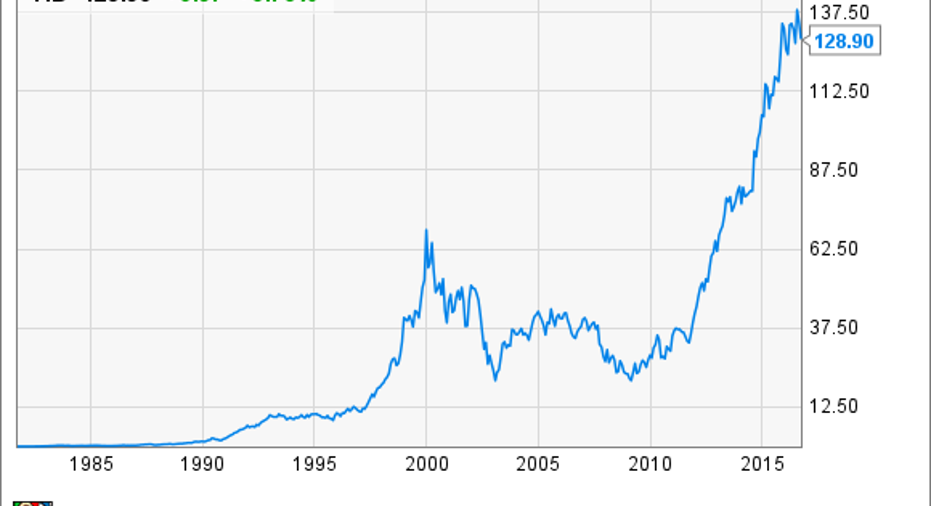What Is Home Depot's Stock Split History?

Image source: The Home Depot.
Investors wouldn't be remiss to wonder whenHome Depot's(NYSE: HD) next stock split is coming based on the stock's surge since the recession.
Companies like Home Depot tend to split stocks after big gains to keep them affordable for smaller investors, though the underlying value doesn't change. It also helps make options cheaper and acts as a sort of first-down marker in the stock's appreciation, a signal the stock has achieved a significant advance and is ready for a reset. In general, these companies try to keep their share prices in a range of $30-$100.
Home Depot has split its stock 13 times in its history, but all of those splits came before 2000. The chart below helps explain why the stock hasn't split in 17 years.
As you can see, the stock surged from its IPO in 1981 to the end of the tech boom in 1999. From then the stock moved sideways under the misguided leadership of Bob Nardelli. Nardelli ran the home-improvement retailer from December 2000 to January 2007. Despite presiding over the company during the biggest housing boom in modern history, the stock lost 8% during his tenure, while shares of rivalLowe'smore than tripled during that period.
Following Nardelli's departure, Home Depot suffered through the recession and has been booming since. With shares now near $130, the stock is higher than at any point during its stock splits. The chart below details those splits.
| Split | Record Date | Payable Date | Price |
| 3 for 2 | 01/05/1982 | 01/19/1982 | 21 |
| 5 for 4 | 04/12/1982 | 04/30/1982 | 17 1/4 |
|
2 for 1 |
11/29/1982 | 12/07/1982 | 49 1/2 |
| 2 for 1 | 06/01/1983 | 06/08/1983 | 54 |
| 3 for 2 | 09/08/1987 | 09/22/1987 | 35 7/8 |
| 3 for 2 | 06/14/1989 | 06/30/1989 | 39 |
| 3 for 2 | 06/14/1990 | 07/06/1990 | 57 7/8 |
| 3 for 2 | 06/05/1991 | 06/26/1991 | 65 3/4 |
| 3 for 2 | 06/11/1992 | 07/01/1992 | 68 3/4 |
| 4 for 3 | 03/24/1993 | 04/14/1993 | 59 1/2 |
| 3 for 2 | 06/12/1997 | 07/03/1997 | 69 1/8 |
| 2 for 1 | 06/11/1998 | 07/02/1998 | 85 7/8 |
| 3 for 2 | 12/02/1999 | 12/30/1999 | 102 |
If you owned one share of Home Depot before its first stock split, you would now have 340 shares, worth more than $40,000.
When will we see another split?
With the share price now in the triple digits, there may be some argument for another stock split, but management has changed since the days co-Founder Bernie Marcus ran the company in the 1980's and 90's when splits occurred nearly every year. Former CEO Frank Blake was asked about a potential stock split in 2013, but threw cold water on the idea, telling shareholders, "We are not going to split the stock. Mathematically, there is no value in a split."
He's right, of course. While shareholders sometimes fixate on a split, it adds no value for investors. Home Depot's formula of resisting opening new stores and instead plowing profits into an improved e-commerce platform, better in-store service, share repurchases, and dividend hikes are what have -- and will -- pay off for investors.
Last December, Home Depot issued goals for 2018, including revenue of $101 billion, representing 4.7% compound growth, improvement in its operating margin from 13% to 14.5%, and an increase in return on invested capital from 26% to 35%.
Home Depot investors would be better off following the company's progress to those goals than rooting for a stock split. If the company can meet those targets, the stock should continue to rise along with its dividends. As for a future stock split, it looks like those days may be over.
A secret billion-dollar stock opportunity The world's biggest tech company forgot to show you something, but a few Wall Street analysts and the Fool didn't miss a beat: There's a small company that's powering their brand-new gadgets and the coming revolution in technology. And we think its stock price has nearly unlimited room to run for early in-the-know investors! To be one of them, just click here.
Jeremy Bowman has no position in any stocks mentioned. The Motley Fool recommends Home Depot. Try any of our Foolish newsletter services free for 30 days. We Fools may not all hold the same opinions, but we all believe that considering a diverse range of insights makes us better investors. The Motley Fool has a disclosure policy.



















